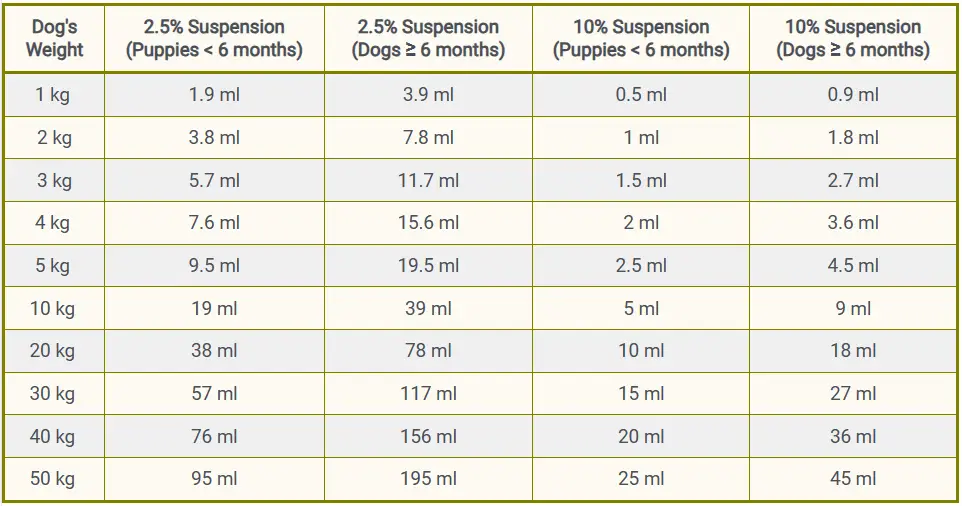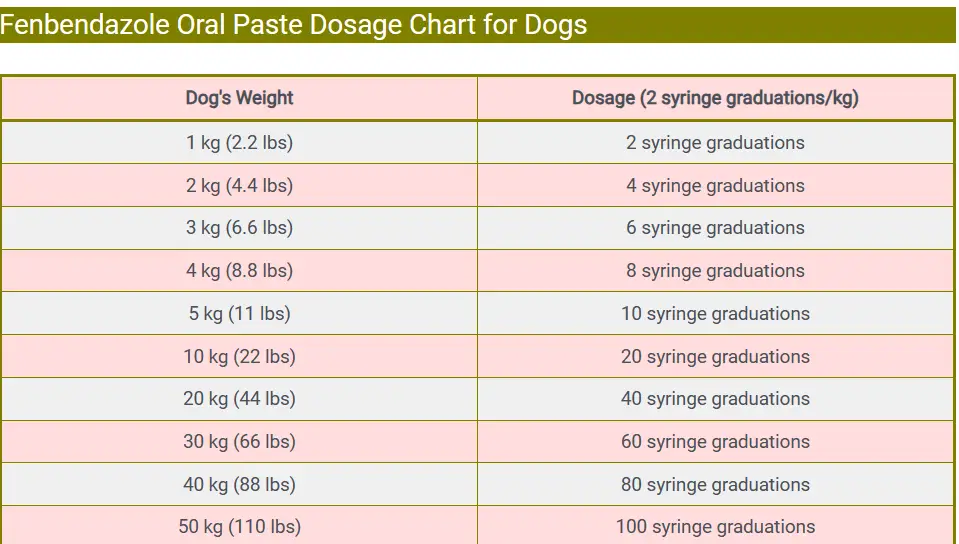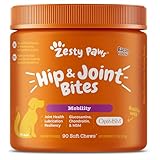The ideal fenbendazole dosage for dogs is 50 mg/kg (22.7 mg/lb) for the treatment of lungworms, giardia, roundworms, and certain species of tapeworms. This medication attacks the internal structure of these parasites, rendering them incapable of feeding or reproducing.
Fenbendazole Dosage For Dogs

-
Ideal Dose: 50 mg/kg (22.7 mg/lb)
-
Uses: Lungworms, Giardia, Roundworms, tapeworms.
-
FDA Approved: Yes
-
Variants: Tablets, Liquid, Granules, Oral Paste.
-
Popular Brands: Panacur, Safe-Guard.
-
Storage & Handling: 30°C (86°F).
-
Administration:
Disclaimer: Self-medication can be hazardous. Please consult your veterinarian for personalized guidance on the appropriate dosage for your furry friend’s specific condition.
Ensuring the health and happiness of our canine companions involves making informed choices about their care, especially when it comes to dewormer medications. One commonly used treatment for a variety of parasitic infections is fenbendazole dosage for dogs.
Understanding the proper fenbendazole dosage for dogs for your furry friend is crucial for its effectiveness and safety.
In this guide, we’ll explore everything you need to know about fenbendazole for canines, from its uses and benefits to potential side effects and precautions, ensuring you have the knowledge to keep your furry friend healthy and parasite-free.
What is Fenbendazole For Dogs?
Fenbendazole is an anthelmintic, which means it’s a drug used to treat infections caused by worms and other parasites. Fenbendazole is an antiparasitic medication commonly used in veterinary medicine, particularly for dogs. It is effective against a range of gastrointestinal parasites such as roundworms, hookworms, whipworms, and certain types of tapeworms.
Initially developed in the 1970s, it belongs to the benzimidazole class of medications, which are known for their effectiveness in treating a variety of parasitic infections in canines.
Fenbendazole Dosage For Dogs
The correct fenbendazole dosage for dogs depends on several factors, including your dog’s weight, age, and overall health. Generally, the dosage is about 50 mg per kg of the dog’s body weight, administered once daily for three consecutive days. However, always consult your vet for precise dosing.
Fenbendazole 2.5% liquid suspension Dosage For Dogs:
- 1.9 ml/kg (0.9 ml/lb) for puppies under 6 months.
- 3.9 ml/kg (1.8 ml/lb) for dogs 6 months or older.
Fenbendazole 10% liquid suspension Dosage For Dogs:
- 0.5 ml/kg (0.23 ml/lb) for dogs under 6 months.
- 0.9 ml/kg (0.45 ml/lb) for dogs 6 months and older.
Fenbendazole Granules Dosage for Dogs:
0.2 grams per kilogram (0.1 grams per pound) means 1 gram per 10 pounds of body weight.
Fenbendazole Oral Paste Dosage for Dogs:
2 syringe graduations per kg (2.2 lbs)
- 50 mg/kg (22.7 mg/lb)
- Panacur liquid 10%, 1 ml/kg
50 mg/kg (22 mg/lb)
Fenbendazole Dosage Chart for Dogs by Weight
| Dog Weight (lbs) | Dog Weight (kg) | Fenbendazole 2.5% Liquid (Puppies < 6 months) | Fenbendazole 2.5% Liquid (Dogs ≥ 6 months) | Fenbendazole 10% Liquid (Dogs < 6 months) | Fenbendazole 10% Liquid (Dogs ≥ 6 months) | Fenbendazole Granules | Fenbendazole Oral Paste | Panacur® | Panacur® 10% Liquid | Safe-Guard® |
|---|---|---|---|---|---|---|---|---|---|---|
| 1 | 0.45 | 0.9 ml | 1.8 ml | 0.23 ml | 0.45 ml | 0.1 grams | 1 graduation | 22.7 mg | 0.45 ml | 22 mg |
| 5 | 2.3 | 4.5 ml | 9 ml | 1.15 ml | 2.25 ml | 0.5 grams | 4.5 graduations | 113.5 mg | 2.3 ml | 110 mg |
| 10 | 4.5 | 9 ml | 18 ml | 2.3 ml | 4.5 ml | 1 gram | 9 graduations | 227 mg | 4.5 ml | 220 mg |
| 20 | 9.1 | 18 ml | 36 ml | 4.6 ml | 9 ml | 2 grams | 18 graduations | 454 mg | 9 ml | 440 mg |
| 30 | 13.6 | 27 ml | 54 ml | 6.9 ml | 13.5 ml | 3 grams | 27 graduations | 681 mg | 13.6 ml | 660 mg |
| 40 | 18.2 | 36 ml | 72 ml | 9.1 ml | 18 ml | 4 grams | 36 graduations | 908 mg | 18.2 ml | 880 mg |
| 50 | 22.7 | 45 ml | 90 ml | 11.35 ml | 22.5 ml | 5 grams | 45 graduations | 1135 mg | 22.7 ml | 1100 mg |
| 60 | 27.3 | 54 ml | 108 ml | 13.65 ml | 27 ml | 6 grams | 54 graduations | 1362 mg | 27.3 ml | 1320 mg |
| 70 | 31.8 | 63 ml | 126 ml | 15.9 ml | 31.5 ml | 7 grams | 63 graduations | 1589 mg | 31.8 ml | 1540 mg |
| 80 | 36.4 | 72 ml | 144 ml | 18.2 ml | 36 ml | 8 grams | 72 graduations | 1816 mg | 36.4 ml | 1760 mg |
| 90 | 40.9 | 81 ml | 162 ml | 20.45 ml | 40.5 ml | 9 grams | 81 graduations | 2043 mg | 40.9 ml | 1980 mg |
| 100 | 45.5 | 90 ml | 180 ml | 22.75 ml | 45 ml | 10 grams | 90 graduations | 2270 mg | 45.5 ml | 2200 mg |
The above Fenbendazole dosage chart for dogs by weight is provided for educational purposes only and should not substitute for veterinary advice.
Always start with the minimum dose for your canine until your vet prescribes an increase in dosage.
Fenbendazole Canine Formulation Variants
Several formulation variants of fenbendazole are available for canine use, each designed to suit different preferences and needs. The primary formulations include:
Granules: These are small, easy-to-mix granules that can be added to the dog’s food. They are convenient for dogs that may resist taking pills or liquid medications. The granules are typically packaged in pre-measured sachets for accurate dosing based on the dog’s weight.
Tablets: Fenbendazole tablets are a versatile administration option. They are often scored, allowing for easy splitting to achieve the correct dosage for dogs of various sizes.
Tablets can be given directly or discreetly hidden in food or treats, giving you the flexibility to choose the best method for your dog.
Suspension: This liquid form of fenbendazole can be precisely measured and administered using a dosing syringe. The suspension is particularly beneficial for accurate dosing, especially in small or large dogs.
It can be mixed with food or given directly by mouth, ensuring your dog gets the proper medication every time.
Paste: Fenbendazole paste is another oral form often used for horses but can be adapted for dogs under veterinary guidance.
The paste allows for a precise dose to be administered directly into the dog’s mouth, which can be helpful for dogs that are difficult to medicate.
Fenbendazole Liquid Suspension Dosage Chart (ml) for Dogs
| Dog’s Weight | 2.5% Suspension (Puppies < 6 months) | 2.5% Suspension (Dogs ≥ 6 months) | 10% Suspension (Puppies < 6 months) | 10% Suspension (Dogs ≥ 6 months) |
|---|---|---|---|---|
| 1 kg | 1.9 ml | 3.9 ml | 0.5 ml | 0.9 ml |
| 2 kg | 3.8 ml | 7.8 ml | 1 ml | 1.8 ml |
| 3 kg | 5.7 ml | 11.7 ml | 1.5 ml | 2.7 ml |
| 4 kg | 7.6 ml | 15.6 ml | 2 ml | 3.6 ml |
| 5 kg | 9.5 ml | 19.5 ml | 2.5 ml | 4.5 ml |
| 10 kg | 19 ml | 39 ml | 5 ml | 9 ml |
| 20 kg | 38 ml | 78 ml | 10 ml | 18 ml |
| 30 kg | 57 ml | 117 ml | 15 ml | 27 ml |
| 40 kg | 76 ml | 156 ml | 20 ml | 36 ml |
| 50 kg | 95 ml | 195 ml | 25 ml | 45 ml |
Fenbendazole Oral Paste Dosage Chart for Dogs
| Dog’s Weight | Dosage (2 syringe graduations/kg) |
|---|---|
| 1 kg (2.2 lbs) | 2 syringe graduations |
| 2 kg (4.4 lbs) | 4 syringe graduations |
| 3 kg (6.6 lbs) | 6 syringe graduations |
| 4 kg (8.8 lbs) | 8 syringe graduations |
| 5 kg (11 lbs) | 10 syringe graduations |
| 10 kg (22 lbs) | 20 syringe graduations |
| 20 kg (44 lbs) | 40 syringe graduations |
| 30 kg (66 lbs) | 60 syringe graduations |
| 40 kg (88 lbs) | 80 syringe graduations |
| 50 kg (110 lbs) | 100 syringe graduations |
How Does Fenbendazole Work?
Fenbendazole works by inhibiting the parasites’ ability to produce energy, leading to their death. It disrupts explicitly the function of microtubules in the cells of the parasites.
This disruption prevents the parasites from absorbing glucose, ultimately starving them to death. Compared to other dewormers, fenbendazole is considered broad-spectrum, meaning it targets a wide range of parasites.
Related Post: Penicillin For Dogs
Fenbendazole Uses in Canines
-
Treats roundworm, hookworm, whipworm, and sometimes tapeworm infections in dogs.
-
May be used off-label for giardiasis and other protozoal infections.
-
Occasionally employed preventively in high-risk environments like kennels.
-
Dosage and duration should be determined by a veterinarian.
Related Post: Cerenia Dosage For Dogs
Side Effects
-
Gastrointestinal disturbances like vomiting and diarrhea
-
Lethargy or decreased activity levels
-
Loss of appetite
-
Rare allergic reactions such as itching or swelling
-
Uncommon neurological symptoms like tremors or seizures
-
Potential for liver or kidney effects, particularly with prolonged or high-dose use
Which Dogs Should Not Take Fenbendazole.
Canines with the following health issues should not take Fenbendazole without veterinary recommendations.
-
Pregnant or nursing canines.
-
Puppies, especially those under six weeks of age.
-
Dogs with known allergies to fenbendazole.
-
Underweight or debilitated puppies.
-
Dogs with pre-existing liver or kidney disease.
-
Dogs taking certain medications, especially those metabolized by the liver.
FAQs
Can I administer Fenbendazole to my dog without a veterinarian’s prescription?
Administering Fenbendazole to your dog without a veterinarian’s prescription is not recommended. Fenbendazole is a medication used to treat various parasitic infections in canines, and its use should be supervised by a veterinarian to ensure proper dosage and administration.
How long does it take for Fenbendazole to work in dogs?
The time it takes for Fenbendazole to work in dogs can vary depending on factors such as the type and severity of the parasitic infection being treated. Typically, improvements may be noticed within a few days to weeks after starting treatment.
Are there any natural alternatives to Fenbendazole for treating parasitic infections in dogs?
Yes, there are some natural alternatives to Fenbendazole for treating parasitic infections in dogs, although their efficacy may vary. Some natural options include diatomaceous earth, garlic, pumpkin seeds, and certain herbs like wormwood and cloves.
Can Fenbendazole be used to prevent parasitic infections in canines?
Fenbendazole can be used to prevent some parasitic infections in dogs when administered regularly as a preventive measure. However, its use for prevention should be based on your veterinarian’s recommendation and tailored to your pup’s individual risk factors and lifestyle.
What should I do if my dog experiences adverse reactions to Fenbendazole?
If your dog experiences adverse reactions to Fenbendazole, such as vomiting, diarrhea, or allergic reactions, you should stop administering the medication immediately and contact your veterinarian for guidance.











![Can Dogs Eat Blood? 7 Side Effects [Expert Opinion]](https://petskor.com/wp-content/uploads/2022/04/Webp.net-resizeimage-12.jpg)
